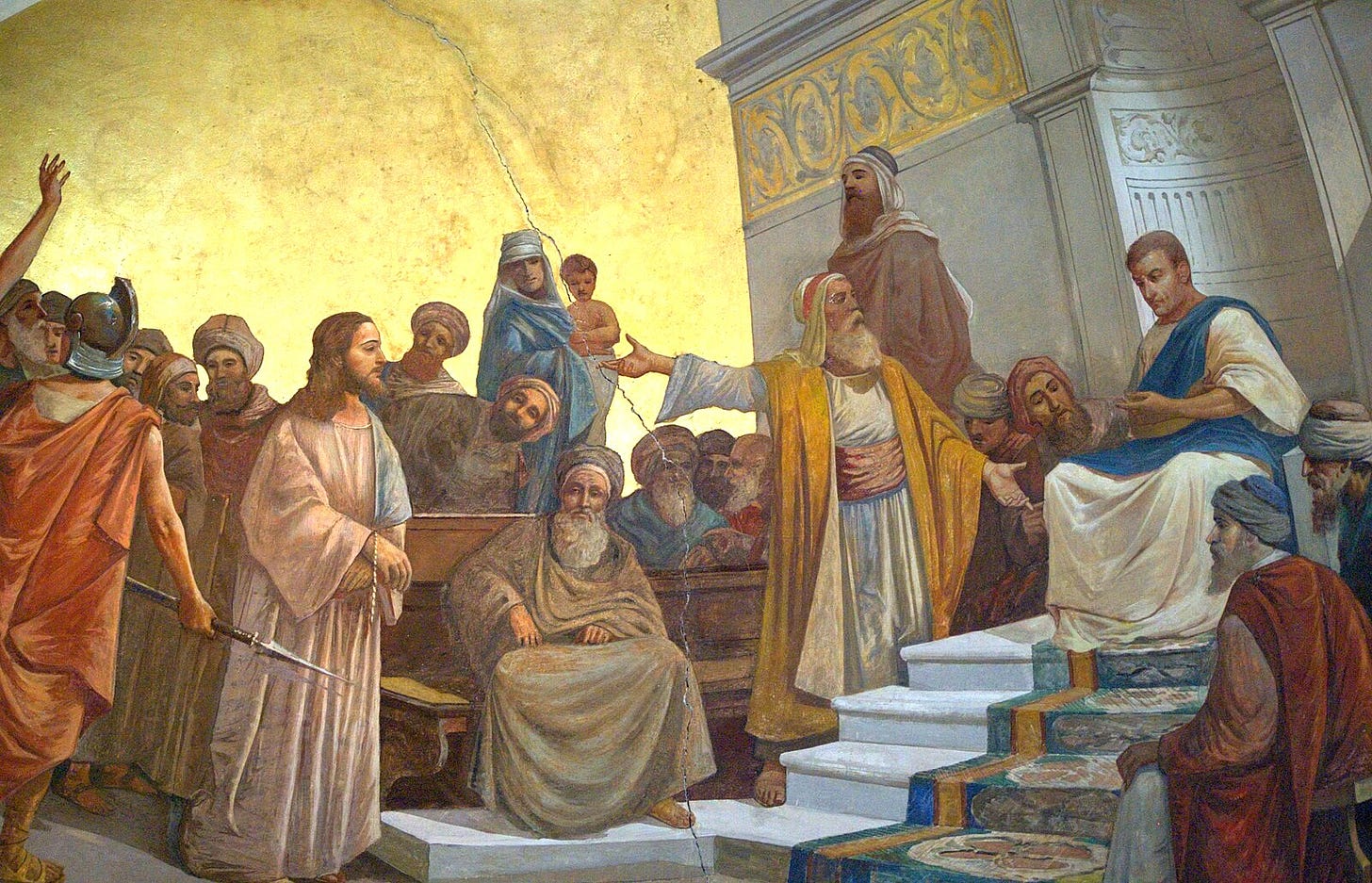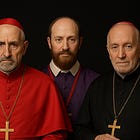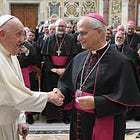Truth above all things: Mission of The WM Review
What is truth? Pontius Pilate's question has never been more important for Catholics.

Pontius Pilate's question has never been more important for Catholics.
What is truth?
These words, spoken by Pontius Pilate to Truth Incarnate, lay down a challenge to Catholics in every generation, and perhaps especially those who have authority or influence over others.
Pontius Pilate was a man with weighty responsibilities and grave problems to face: the preservation of public order, the security of the Empire, the safety of his wife and household, and concerns about his own status and prospects.
Like many men in difficult situations, he took the course of action that seemed most expedient, without first ascertaining whether it was in conformity with the truth. And thus, he handed the First and Ultimate Truth over to torture and death.
Pontius Pilate therefore has a lesson to teach to every succeeding age about the folly of prioritising consideration of what is “useful” or “expedient” over what is true. He had Truth Himself standing before him but was so much occupied by immediate problems that he could not recognise Him.
The temptation of Pilate is a temptation faced by many Catholics today as the Church continues to endure the greatest period of trial in her history.
What is truth?
Philosophy answers the question “what is truth?” by telling us that truth is the “conformity of thing and intellect.”1
The intellect acquires knowledge about the things that exist, through abstraction from sense data, and through reasoning from what it already knows. When the intuition and judgements of the intellect conform to how things really are, the intellect possesses truth.
Things exists outside the intellect. Truth is the conformity of the intellect to the reality of those things.
God is self-existent being therefore God is the ultimate truth. He is fully known only by Himself, for no created intellect is adequate to know Him.
Truth in speech or writing
Truth in speech or writing is attained when the words used adequately express the truth known by the intellect. Speech or writing which conveys ideas which do not conform to reality, is false. And if a person deliberately conveys notions contrary to the truth known by their intellect, they are lying. Lying is always sinful because lying violates the very nature of speech, which is to convey truth.
On the other hand, while one may never speak contrary to the truth, we do not always need to express everything that we know – there are times when silence or reserve is prudent
There are however occasions when we must speak the truth. For example, there are occasions when making a profession of the Catholic faith is obligatory, even if death will be the certain consequence. Even children are bound to profess the faith in such circumstances.
When Catholics set themselves up as commentators on religious or theological questions, and share their opinions with others, they clearly have an obligation to pursue truth above everything else.
In the first place, this means assenting to everything proposed for our belief by the Sacred Magisterium of the Catholic Church, whether by extraordinary judgement or through her universal and ordinary teaching. These truths are revealed by God, who can neither deceive nor be deceived. Our knowledge of them is certain and admits of no grounds for doubt.
There are other theological questions of which we do not have such certainty. And outside theology there are vast realms of human thought, in which the human intellect is free to use its powers in search of truth.
How should a Catholic commentator treat of such questions?
We believe that the man who seeks to share his opinions with others, and especially who seeks to convince others of his point of view, ought to make sure he knows what he is speaking about before he makes his ideas public.
In his encyclical on Americanism, Pope Leo XIII condemned “the confounding of license with liberty, the passion for discussing and pouring contempt upon any possible subject, the assumed right to hold whatever opinions one pleases upon any subject and to set them forth in print to the world”.2
Many today, and sadly Catholics among them, think that they have a right, almost a duty, to put their opinions out into the world, without having given the subject under discussion any serious consideration at all. No such right exists, indeed “every idle word that men shall speak, they shall render an account for it in the day of judgment. For by thy words thou shalt be justified, and by thy words thou shalt be condemned.” (Mt 12:36)
If a man knows nothing of a subject, he ought to keep his thoughts to himself. If he thinks he has something to contribute, he should express himself in a manner befitting his degree of knowledge and the certainty of his conclusions. If not, he risks falling under the censure of John Henry Newman:
It were well if none remained boys all their lives; but what more common than the sight of grown men, talking on political or moral or religious subjects, in that offhand, idle way, which we signify by the word unreal?
“That they simply do not know what they are talking about” is the spontaneous silent remark of any man of sense who hears them.
Hence such persons have no difficulty in contradicting themselves in successive sentences, without being conscious of it.[3]3
Newman continues by drawing attention to other traits that the “Catholic influencer” would be wise to avoid:
[O]thers, whose defect in intellectual training is more latent, have their most unfortunate crotchets, as they are called, or hobbies, which deprive them of the influence which their estimable qualities would otherwise secure. Hence others can never look straight before them, never see the point, and have no difficulties in the most difficult subjects.
Others are hopelessly obstinate and prejudiced, and, after they have been driven from their opinions, return to them the next moment without even an attempt to explain why. Others are so intemperate and intractable that there is no greater calamity for a good cause than that they should get hold of it.
There is no virtue in adopting simplistic positions, in an attempt to look “strong”, nor is there any virtue in avoiding simple expression of truths, in a misguided belief that complexity looks more “intellectual.”
All that matters is whether what is said is true. Sometimes truths can and must be expressed in a simple and straightforward manner. On other occasions, the truth can only be expressed in great detail and with much nuance.
The Catholic commentator ought to strive for intellectual humility, his goal must be truth, and not to project an image of himself. His writing ought always to be intended to lead the reader towards the truth. It should seek to illuminate questions, and expose and resolve difficulties, rather than obscuring them or covering them up.
He ought to express positions because he really thinks they are true, rather than because he wants to be associated with a particular group or accepted in certain circles. Indeed, such people are ultimately of very little use to a cause. Many who adopt partisan positions eventually abandon them, because they never really understood them. In the meantime, they weaken the cause itself by the weakness of their arguments.
The Catholic commentator would also be wise to remember that he isn’t obliged to express his opinions on every question that arises.
Silence does not get views, clicks, likes or donations. But it does bring something more precious: self-respect and the respect of those whose opinions actually matter.
Does ‘Trad Inc.’ exist?
There has been much talk recently of “Trad Inc.” – by which is meant a broad group of loosely traditionalist commentators, who often seem to march in lockstep with each, and to continually promote each other’s platforms. At present it is being applied particularly to those who have jumped on the “Leo XIV” bandwagon, wilfully closing their eyes and ears to his words and actions, before and after his purported election.
We do not believe that any sinister human organisation connects all these commentators, but we do think that the term “Trad Inc.” captures a real phenomenon.
“Trad Inc.” is a broad range of commentators who, by choice or through lack of knowledge, limit themselves to expressing opinions that fall within the acceptable bounds of mainstream traditionalist discourse, and restrict themselves to a narrow framework of arguments and reference points that have hardly changed since the 1980s.
There are many rewards for staying within these bounds. Even for those who do not benefit financially, or enjoy status within these circles, there is the feeling of being part of a movement that is, somehow, destined to save the Church. This feeling persists even though in the “Recognise and Resist” camp today there is a lot of focus on “recognition” and not much evidence of “resistance.” There are also strong personal bonds, reinforced by speaking at the same conferences, attending the same events, promoting each other’s work, and so on.
Both the editors of the WM Review used to hold the standard “Recognise and Resist” position, and were involved in R&R circles. After studying the question, we each came to consider that the theological arguments underpinning this position simply don’t stand up to serious analysis.
At that point we discovered that “Trad Inc.” has taboos that can’t be questioned. You can mock, insult, contradict, and disobey, post-conciliar claimants as much as you like (at least, before Leomania you could) but don’t try to calmly put forward an argument that these men might not have been popes.
The psychological security of “Trad Inc.” requires excluding and pathologizing the “sedevacantist” other. As Fr Noel Barbara said so many years ago:
Some have cleverly invented the term "sedevacantist" and apply it to us in a derogatory sense; but we are no more "sedevacantists" than we are "traditionalists". We are Catholics, and it is precisely for that reason that we must insist so strongly on the urgent need to submit to the magisterium of the popes and of the councils.4
“Trad Inc” has placed “sedevacantism” outside the acceptable bounds of thought, and thus has kept many minds from considering arguments that might bring them much illumination regarding the ordeal the Church is undergoing, as well as possible solutions.
For more than fifty years, the mainstream traditionalist movement has failed to adequately consider the theological aspects of the “crisis in the church”. That is why, in our opinion, its resistance continues to weaken, while the conciliar-synodal revolution advances in strength from year to year.
At the WM Review, we are determined to not close our minds to any questions, or to any lines of thought, save only those which are incompatible with the truths which God has revealed. We never have, and never will, adopt or express a position for any other reason than that we have given the issue serious thought and consider our conclusions to be valid.
We will not get everything right, but we will always write what we believe to be true, or what we consider we have good reasons to believe to be true. We may not always live up to the standards we outlined above, but we will always try to do so.
Despite our best efforts, our serious research, our desire for precision, our caution, and our desire not to go a step further than an argument leads, what we write will be dismissed and ignored by some because they will label us “sedevacantists”.
To us, this is nothing more than a mild annoyance. Those are not the people for whom we are writing.
What is important to us is that we are reaching many men and women who are looking beyond the “Trad Inc.” gatekeepers, and are seeking solutions which are fully grounded in Catholic theology and the Tradition of the Church.
Our only goal is that in some small way God may use us to glorify Himself in the coming vindication of His infallible and indefectible Church.
Therefore, we dare to make our own the words of Fr Noel Barbara:
It is true that in terms of strength we are a less than negligible fraction: we are nothing, or nearly so. Running counter to all, despised even by those who until yesterday were our brothers in Catholic fidelity, there is nothing left to us but to disappear, according to the wishes of many. Except by placing our assurance not in ourselves (how could we be tempted to do so in our condition?) but in Him who gives us strength, we would not have the certitude that Our Lord will not close the mouths of those who praise Him.
Consequently, everyone should understand that the words of the Apostle apply to us "as deceivers, and yet true: as unknown, and yet known: as dying and behold we live: as chastised and not killed: as sorrowful, yet always rejoicing: as having nothing and possessing all things" (II Cor VI, 9-10). In fact, we do indeed speak the truth, since we will have no other doctrine than that of Holy Church, the one truth above all others.
We are indeed known, since behind the affectation of contempt which is displayed to us it is clear that we are disturbing everyone, and everyone knows it. We are alive, since despite the efforts of all those who hate us, we still exist; we endure by the grace of God. We rejoice, because our conscience is at peace, and because our understanding is full: the longer we continue, the more we see that what we profess is wholly inconformity with defined truth. For us all is simple. For them, everything is complicated, forced as they are into mental acrobatics by which they deceive themselves. We possess all things, because by serving Our Lord and His Church, we already have our reward. 5
HELP KEEP THE WM REVIEW ONLINE WITH WM+!
As we expand The WM Review we would like to keep providing free articles for everyone.
Our work takes a lot of time and effort to produce. If you have benefitted from it please do consider supporting us financially.
A subscription gets you access to our exclusive WM+ material, and helps ensure that we can keep writing and sharing free material for all.
You can see what readers are saying over at our Testimonials page.
(We make our WM+ material freely available to clergy, priests and seminarians upon request. Please subscribe and reply to the email if this applies to you.)
Subscribe to WM+ now to make sure you always receive our material. Thank you!
Read Next:
Follow on Twitter, YouTube and Telegram:
St Thomas Aquinas, On Truth, q.1 a.1.
Pope Leo XIII, Testem Benevolentiae Nostrae.
John Henry Newman, The Idea of a University, Preface.
Fr Noel Barbara, Fortes in Fide, Vol 2. No. 1.
Fr Noel Barbara, Ecône Full Stop.





The title of the article would in an ideal world read “the mission of Catholics.” Thanks for writing it and attempting to address the social stigma that has been created to keep Catholics from the truth.
Also, really interesting that you both held the R&R position. It makes it easier to share your work with others who currently hold that position.
Thank you seems so spare a comment….yet I offer it from the bottom of my heart. I said to a friend years ago, who was discussing with me resistance to seeing Truth, that until you are willing to let your heart be broken by the realization of how much you’d been lied to, you can’t.
We all tend to guard ourselves, at least to a degree, from the stark horrors of life. We are all waiting to exhale. Especially when the stakes are high, and what stakes could be higher than the Truth that is required for our salvation?
I read the following piece very recently. It is very different in some ways from yours (mine) and comes to perhaps a different conclusion but has that same beautiful and sincere ring of being willing to lose all for the sake of Truth.
As we negotiate this very tender but requisite moment in history may our common search for Truth be what binds us, even as Truth’s Sword divides away from us the Father of Lies and his works.
https://open.substack.com/pub/radicalfidelity/p/how-to-keep-your-soul-when-the-church?r=c6q4u&utm_medium=ios